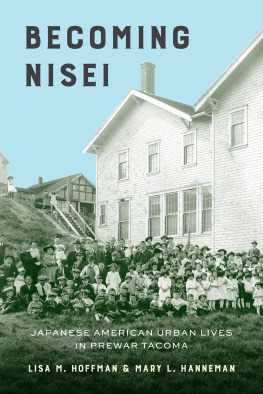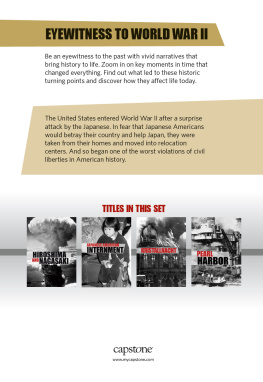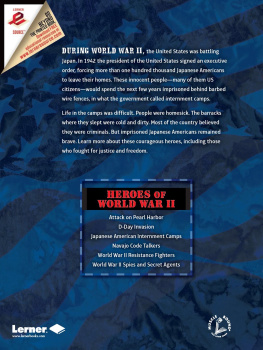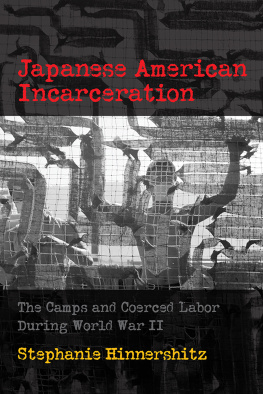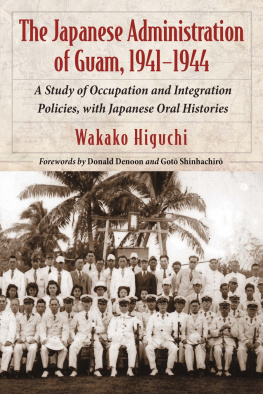We Chose Colorado
Japanese American Voices
By Joyce Lebra
Copyright 2016 Joyce Lebra
All rights reserved. No part of this publication may be reproduced, stored in a retrieval system, or transmitted, in any form or by any means, electronic, mechanical, photocopying, recording or otherwise, without the prior written permission of the author.
Joyce Lebra asserts the moral right to be identified as the author of this work.
Publishers Cataloguing-in-Publication data
Names: Lebra, Joyce C. (Joyce Chapman), 1925
Title: We Chose Colorado: Japanese American Voices / by Joyce C. Lebra
Description: Palm Springs, CA: Old John Publishing, 2016 / Includes bibliographical references and index.
Identifiers: LCCN 2016908276 (print) / ISBN 978-0-9863873-7-1 (hardcover) / ISBN 978-0-9863873-8-8 (paperback) / ISBN 978-0-9863873-9-5 (ebook)
Subjects: LCSH: Japanese AmericansColoradoBiography. / Japanese AmericansColoradoHistory./ ImmigrantsColoradoBiography.
Classification: LCC F785.J3 L4 2015 (print) / LCC F785.J3 L4 (ebook) / DDC 978.8
LC record available at https://lccn.loc.gov/2016908276
Any references to Internet Web sites (URLs) were accurate at the time
of writing. Neither the author nor Old John Publishing
is responsible for URLs that may have expired or
changed since the manuscript was prepared.
Contents
Preface
I. Japanese Immigration to the U.S.
II. Japanese Immigration to Colorado
III. Prewar Japanese Immigrants to ColoradoVoices
IV. Postwar Japanese Immigrants to ColoradoVoices
V. Conclusions
Acknowledgments
Notes
Glossary
Source Suggestions
Index
PREFACE
Part of my background dates to my childhood in Honolulu, at a time when Japanese were forty percent of the population and the largest ethnic group there. So from my earliest memory I have had Japanese friends and have been surrounded by aspects of Japanese culture.
One of my first students at the University of Colorado in the early 1960s was Robert Watada. I got to know Bob better than I did most students because one day he drove me up to his Ft. Lupton home to meet his parents. There they worked and lived on a large farm. I knew that Bob had two brothers, so I remarked to his father that it was fortunate that he had three sons since he was farming. He replied, Do you want to see how many sons I have? When I nodded affirmative, he brought out a photograph of ten sons, of whom he was obviously very proud. It was amazing to me that his mother, in addition to the daunting task of raising ten sons and two daughters, also had the time and talent to write tanka poetry, a classical poetic form of seventeen syllables. This mothers book of tanka poetry has been published in both Japanese and English, and today each of the Watada children has a copy, which was shown to me by Dr. Alley Watada.
Since this early introduction to the Watada family, I have kept in touch with Bob. When he graduated, he volunteered for the Peace Corps and spent nearly two years in Peru. I encountered him some years later when he was working for the State of Hawaii as State Elections Commissioner and I was visiting professor at the University in Honolulu. I met him later when I lived on Maui after my retirement. My most recent encounter with Bob was when I was doing a book signing in Portland, Oregon a few years ago, and he and his Peruvian wife Rosa took me to Portlands famous rose gardens. Now Bob has a ranch in Oregon, where he raises hazelnuts and alpacas.
The large Watada family, with its many sons, daughters, grandsons and granddaughters and subsequent generations, has made noteworthy contributions to the State of Colorado, as well as to other states. The Watada family has served as the entre to this study, and I have been privileged to have been able to meet several members of this exemplary family here in Colorado.
The other impetus to undertake this project came from a long-time friend, David Wagner, who has worked in Japan for thirty years and who first suggested to me that I turn my attention to the Japanese American population of Colorado. My gratitude to the Watada family and to David Wagner thus deserves special mention here. I am also particularly indebted to Professor Russell Endo, an authority on Asian American Studies, who took great care in reading chapters of the manuscript and made many valuable suggestions. My other acknowledgments, and there are many, are noted separately.
This is a book bringing together the voices of a diversity of Japanese Americans who settled in Colorado from the first immigrants until today.
For those interested in more detail based on research on Japanese Americans in Colorado, I refer them to the M.A. thesis by Kara Mariko Miyagishima: Colorados Nikkei Pioneers: Japanese Americans in Twentieth Century Colorado, University of Colorado-Denver, 2007. This thesis contains a twenty-five page bibliography.
Chapter I
JAPANESE IMMIGRATION
TO THE UNITED STATES
INTRODUCTION
Immigrants left Japan to come to America for some of the same reasons people left other countries to the arrive on the shores of the U.S.economic distress at home and the hope for a better life for themselves and their families in the new land. The earliest Japanese immigrants to America arrived in 1869, immediately after the new Meiji Government ended hundreds of years of feudalism. Japanese arrived first in the Territory of Hawaii, recruited to work as contract labor in the sugar and pineapple fields in a plantation economy. Sugar and pineapple companies sent recruiting agents to Japanese ports with enticing promises of wages five times what they could hope to earn in Japan. Some of the earliest immigrants were able to move on to the west coast of the United States once their three year contracts ended. Others remained in the Islands to settle and raise families, to become the largest ethnic group in Hawaii prior to World War II.
As early as the 1870s and 1880s the first trickle of Japanese immigrants arrived in the continental United States, at San Francisco, Oregon, and Washington. Japanese left their homeland to travel to the unknown country across the Pacific for similar reasons that immigrants came from other parts of the world, but also for some reasons that were distinctive to the new Meiji Governments policies in Japan.
The spirit of the Meiji Government encouraged travel abroad to acquire knowledge of the modern world. On the other hand, some policies of the new government restricted travel in later years. In the United States also, policies and legislation also had a dual impact, both recruiting Japanese labor and later restricting the arrival of more Japanese.
In 1868, the Meiji Government ended some seven centuries of feudalism and the Tokugawa Shogunates policy of isolation. The Toku-
gawa Shoguns had closed Japan from all foreign contact, with the exception of the small Dutch enclave at Dejima, an island off the coast of Nagasaki. Dejima had functioned as the channel through which the Shogunate had filtered knowledge about Western geography, medicine and trade.
The 1854 Treaty of Kanagawa, followed by the 1858 Harris Treaty, opened Japan to the rest of the world and provided for the presence of American consular jurisdiction on Japanese soil. The Meiji government was intent on strengthening Japan by means of adopting modern Western institutions in many areas. The Charter Oath of the new government proclaimed that evil customs of the past shall be abolished, and knowledge shall be sought throughout the world so as to invigorate the foundations of imperial rule.


